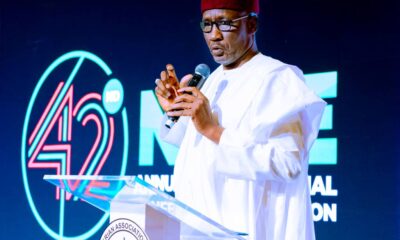Business
Dangote Refinery vs NNPCL: Unfortunately, Nigeria needs both companies to thrive
It is also sad to note that the Dangote refinery has not produced any duly signed and legally enforceable agreement with any domestic crude oil supplier prior to this time and for the purpose of feedstock supply to the refinery, which is very strange for a business of that magnitude, and a highly unusual and unprofessional practice in the oil and gas industry. This is actually the crux of the matter as the oil industry apparently operates differently from the cement and other industries where Mr. Dangote has been an experienced player for decades.
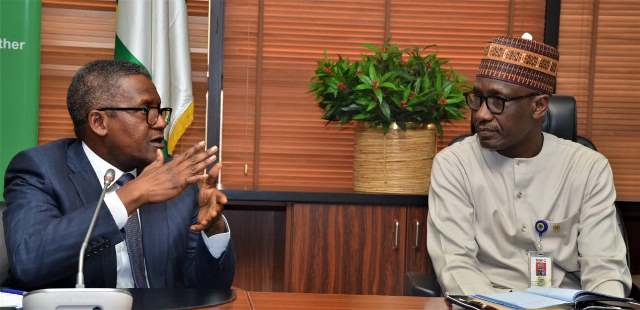
By Yemie ADEOYE
THE saying that when two elephants fight, the grass suffers is being brought to light and affirmed more than any time in recent history by the ongoing tussle nay controversy between the Dangote refinery and the federal government of Nigeria as represented by the state-owned Nigeria National Petroleum Company Limited, NNPCL and the industry regulatory agency, the Nigerian Midstream and Downstream Petroleum Regulatory Authority, NMDPRA.
Gracefully, the minister of petroleum resources, Mr. Bola Tinubu, who also ‘doubles’ as Nigeria’s President has waded in to offer some succor via a directive to the NNPCL to sell a percentage of Nigeria’s crude in Naira to the Dangote refinery. That was a relief according to several industry watchers even if it is seen as a short term solution to a long term situation.
Even as that seem to have calmed frayed nerves for a bit, reports and counter reports continue to hit the news, thereby keeping the issue on the front burner, even after a presidential mediation. Only recently, there has been a back and forth over the facilitation and non-delivery of 29 million barrels of crude oil to the refinery.
It goes without saying that the advent of the Dangote industries in the business of refining at the time it did, and up until this moment was and is still is, a necessity for the Nigerian economy. Even if it’s just for the dignity and pride it brings to the African continent, that alone is enough to fight or die for.
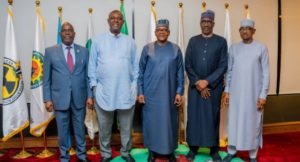
Nigeria’s Minister of State for Petroleum Resources, Heineken Lokpobiri , flanked by Alhaji Aliko Dangote, and heads of NNPCL, NUPRC, NMDPRA
This is outside other immediate economic advantages that accrues to Nigeria as a country, from mass employment to indirect domestic businesses, FDI attraction reduction in forex need and pressure amongst others. The list as they say is endless, only if our business climate is not unduly charged, cumbersome, and difficult for no logical reason.
Almost the same thing applies to the NNPCL, save for the fact that it is a public trust. This company, since inception in 1977 is now almost the single most important company in Nigeria, if only we allow it to work for the country. The issues aren’t so difficult to address, but it seems Nigeria has allowed undue politics and interference to affect the functionality of the NNPCL.
Oil, amongst a few others, is a globally priced commodity, which reacts negatively to undue and non-technical interference. This is the bane of the NNPCL debacle, and until the company, supposedly the largest oil company south of the Sahara is completely free of this interference and obstacles, thereby operating like any other International Oil Company, it will be absolutely impossible for the company to reach its full potentials for the benefit of the global oil and gas industry and the Nigerian economy specifically.
Over the decades, there has been several suggestions on the most beneficial modus operandi for the company, with many experts agreeing that the Nigeria Liquefied Natural Gas, NLNG module will best serve the oil behemoth and better position the company for international plays just like it’s supposed contemporaries, Saudi Aramco, PETROBRAS, PETRONAS, Equinor, SONANGOL and their likes.
Currently, the operational rig count in Nigeria is around 15 rigs. This is abysmally low when compared to other major oil cities or countries. The state of Texas in the USA has 278 operational rigs at work at the time of this report, while Saudi’s Aramco has 300. Algeria has the highest in Africa at 42 rig counts, while even troubled Libya has 20 operational rigs at the moment.
This should serve as a crucial area of focus for the current Nigerian government and indeed, the NNPCL, in order for the country to at least meet the traditional OPEC quota of 2.4 million barrels and enable it meet its contractual obligations, and still feed all domestic refineries starting with the Dangote refinery, with a proviso to produce first for the nations’ local consumption before any export in the interest of national security.
It goes without saying that there would be interests, both foreign and domestic that prefers the status quo and current modus operandi to stay in effect, as they are direct and indirect beneficiaries of the current system, and this is why it is pertinent for the two companies to come together for the common good and national interest.
We live in a world where perception is almost reality, and Nigeria must never lose sight of this fact. Mr. Aliko Dangote is first and foremost a Nigerian, subject to the laws of the country, hence there are several legitimate ways the government can protect its own interest, if any without resorting to a public show.
Again, Inspite of himself and whatever allegations, sentiments or petitions that are leveled against him, Aliko Dangote ought to be properly managed by the regulators and the government for the giant strides he has embarked upon, thereby putting Nigeria on the global map for something positive outside of entertainment.
The nation’s regulator calling out such an investor, said to be the highest single tax payer in the country in such casual manner and on national television is not in the best interest of the nation’s fledgling economy, and image, especially in such a news sensitive industry.
It is also sad to note that the Dangote refinery has not produced any duly signed and legally enforceable agreement with any domestic crude oil supplier prior to this time, and for the purpose of feedstock supply to the refinery, which is very strange for a business of that magnitude, and a highly unusual and unprofessional practice in the oil and gas industry. This is actually the crux of the matter as the oil industry apparently operates differently from the cement and other industries where Mr. Dangote has been an experienced player for decades.
However, the Nigerian people are of any consideration in this equation, then It is in the best interest of Nigeria’s economy that the NNPCL, the NMDPRA, and the owners and management of the Dangote refinery sheath their swords and work together for the common good of the country. If that is the focus, it will be far too difficult to fight so publicly and so dirty. The opportunity of this massive Nigerian establishment must never be blown on the altars of ego and personal interest.
The job of any government is to create a conducive atmosphere for every business interest both local, foreign, public or private to thrive, and for a struggling economy which currently begs for foreign direct investments above all else, no ambassador is better positioned for that message at this moment, than Mr. Aliko Dangote, Inpsite of himself. He has been there, and against all odds, he has done that which others are too concerned, or too cautious to do. The NNPCL has to strategically increase its crude oil production to meet new demands. the company has to be intentional about this, it certainly isn’t a rocket science to achieve that, and that should be the log term focus.
That refinery, should be to the benefit of the NNPCL, the people and government of Nigeria, and of course the owners and management of the company, and this can only happen if national interest is the collective goal.
A sports team does not play or score goals against itself and still appear normal to spectators.
Business
CSR: Dangote Cement Fuels Education With Support Projects At Lagos Schools
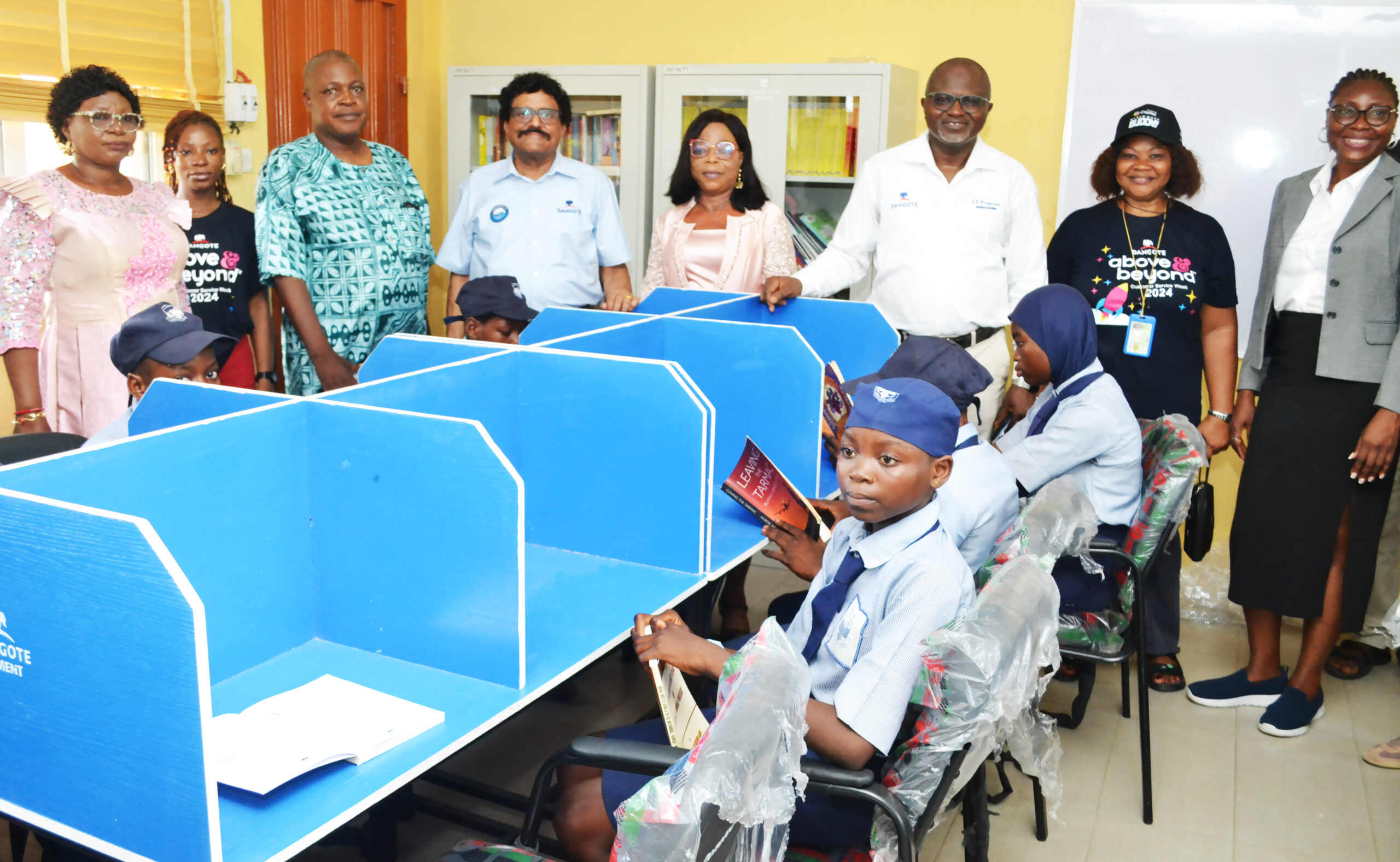
Dangote Cement Plc, a leading cement manufacturer, has donated multi-million Naira educational support projects to secondary schools in Lagos as part of its social investment initiatives.
The company in a statement explained that the move is aimed at complementing the government’s efforts in providing quality and sustainable education in the state.
It was gathered that the projects were commissioned and handed over to various schools in the Ikoyi-Obalende Local Council Development Area, align with the Sustainable Development Goals (SDGs) on education. These goals focus on ensuring inclusive, equitable, and quality education, as well as promoting lifelong learning opportunities for all.
The projects, warmly received by both teachers and students, include 100 dual school desks for Ilado Community Junior High School and Wahab Folawiyo Senior High School, alongside a refurbished and fully equipped Chemistry Laboratory at the Government Senior Secondary School, Ikoyi.
ALSO READ: Dangote Cement Ibese Fetes Host Communities’ Senior Citizens
Also donated were reading tables, chairs, and bookshelves for the library at Government Junior Secondary School, Ikoyi.
A celebration also took place at Falomo Junior High School and Ireti Senior Grammar School, both in Ikoyi, where the company donated 20 brand-new desktop computers to the ICT departments of the schools.
At the event at Government Junior College, Ikoyi, the Group Managing Director of Dangote Cement Plc, Arvind Pathak, explained that social investment is a key part of Dangote Cement’s operations.
He said the company is dedicated to giving back to society and supporting the sustainable development of local communities, especially in areas where it operates.
Pathak’s address was delivered by Wakeel Olayiwola, the Head of Social Performance at Dangote Cement Plc.
He said, “education holds a pivotal role in the development and empowerment of the youths in the country. As a cornerstone for societal advancement, it serves as a critical tool for personal growth, economic development, and national progress. An educated youth population not only fosters individual success but also contributes significantly to the nation’s overall wellbeing.
“At Dangote Cement, we believe that providing quality education to our youth is vital and should not be left solely as the government’s responsibility. Thus, we aim to partner with the government to enhance educational development in this regard.
“The projects we are handing over today are part of our 2024 Corporate Social Responsibility (CSR) programme for selected schools within the neighbourhood of Dangote Cement Plc’s Head Office in Ikoyi, Lagos. These projects were selected based on need assessments in collaboration with the schools.”
As a responsible corporate entity, Pathak noted that Dangote Cement’s commitment to societal wellbeing, with investments in four key areas: Education, Healthcare, Infrastructure, and Economic Empowerment programmes.
“This year, our plants in Ibese, Ogun State; Obajana, Kogi State; Gboko, Benue State; Okpella, Edo State; and our Pan-African operations have launched several social investment projects. These efforts contribute to the quality of life in our host communities and support sustainable national development,” he added.
Pathak thanked the Lagos State Government, the Tutor General/Permanent Secretary, and the school management teams for their collaboration in identifying the schools’ needs and ensuring the timely completion of the projects.
Dr. Idowu Olufunke Oyetola, Tutor General and Permanent Secretary of Education District 3, Lagos State Ministry of Education, who was represented by Bolaji Rotimi Ajayi, Director of School Administration, praised the long-standing partnership with Dangote Cement, noting that the schools selected for the donations were fortunate beneficiaries. “We hope for more collaborations that will positively impact education,” she added.
The principals of the recipient schools expressed their gratitude after the formal handover of the projects.
Odunlami Olubunmi, Principal of Ilado Community Junior High School, Ikoyi, thanked Dangote Cement for the new desks, stating that the donation would significantly improve the learning environment for the students, helping to prepare them for a brighter future.
Bamidele Ayotunde, Principal of the school with the refurbished laboratory, urged other businesses to follow Dangote Cement’s example in supporting local schools, pointing out the positive impact of the laboratory’s renovation on the school’s learning environment.
The Principal of Ireti Senior Grammar School, Ikoyi, whose school received the new desktop computers, described the donation as a positive development and expressed hope for more support in the future.
Pupils also shared their appreciation for the contributions. Abiola Jamaudeen, a lab prefect at Government Senior College, Ikoyi, promised that the laboratory would be used to its fullest potential and well-maintained.
Lawal Rumayzo Abdulsalam, a student at the school, said the new library equipment would foster better reading habits and create a more conducive environment for learning, ultimately preparing them for success. Some students even performed special songs to welcome the Dangote team to their schools.
Business
Adeleke Flaunts Local Content Records, Industrialisation Progress
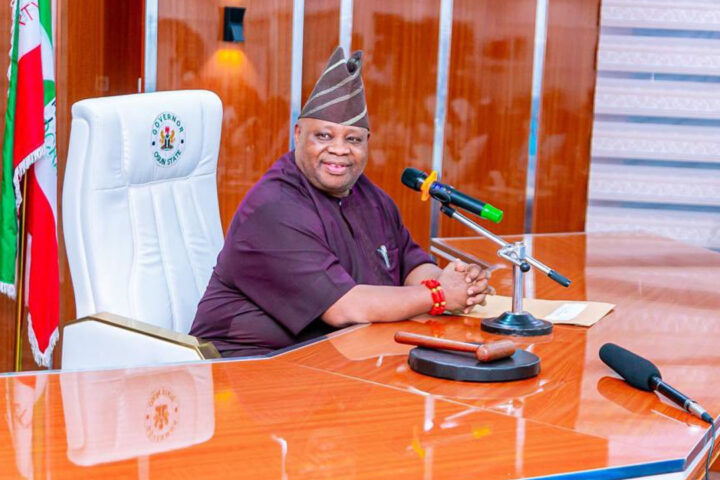
Osun State Governor, Senator Ademola Adeleke has celebrated the local content achievements of his administration, claiming it has transformed the state’s economy and strengthened local businesses.
The Governor, represented by his Deputy, Prince Kola Adewusi, made this declaration at the 2024 Trade Fair of the Osun State Chamber of Commerce and Industry held at the Trade Fair Complex, Osogbo.
This year’s fair is themed “Developing Osun Local Content Value Chain for Shared Prosperity”.
Gov Adeleke, reviewing his records on local content in the last two years, expressed pride to announce that his administration had set an unrivaled record in the promotion and commitment to local content development.
ALSO READ: Diri Celebrates Consummate Democrat, GEJ @ 67
According to Gov Adeleke, “our major infrastructural projects are being handled by local contractors. We are building up our indigenous companies to handle major jobs outside the state. Our local engineers are fully engaged in all facets of the construction processes. Our supply chain feeding the construction processes is also locally focussed and sourced.
“As local content is a tool for economic development, our multi billion naira infra plan has a focus beyond Osun money revolving within the Osun economy. We seek to stop capital flights, thereby ensuring a financially vibrant local economy that contributes to the fight against poverty and underdevelopment.
“Beyond a solvent grassroots economy, our policy ensures skill transfer. Local workers are empowered with requisite skills which they subsequently deploy as skilled service providers. We are building a pool of skilled citizens across all sectors.
“Additionally, our local content agenda is a strategy for employment creation. By adopting direct labour in many project executions, we provide jobs for the artisans and the unemployed. Osun is indeed a huge construction site with increasing job opportunities for the unemployed.
“Local content as a state strategy also drives our focus on infra growth and development. We are eager to bridge the infrastructure deficit to enhance trade and investment. We have recorded huge progress in that respect.
“Our administration is also removing possible bottlenecks in business operations in Osun state. The processing of Certificates of Occupancy is now within a 45-day window. This is billed to enhance business capacity to attract financial transactions and support within the business ecosystem.
“The era of multiple taxation is coming to an end as Osun state has now introduced a harmonized tax system. Our tax agency has become truly business friendly.
“To facilitate investment, we revive and strengthen the Osun State Investment Promotion Agency (OSIPA). The agency puts under one roof all regulatory and certification agencies of the Government.
“To accelerate the pace of industrialization, we revive the Free Trade Zone to provide over one million direct and indirect jobs for the people. We establish Markets with modern facilities, set up farm produce aggregation centres, and put life into moribund industries among others.
“The State Government recently hosted an Industrial Investment Summit. The event attracted local and international investors. While the current industrial policy is being vigorously implemented, we plan to review the policy to accommodate new realities occasioned by modern innovations and Artificial Intelligence.”
While restating his administration’s readiness to partner with the organized private sector, Gov Adeleke urged the business chamber to expand its scope, calling on the business leaders to reach out within and outside Nigeria for the development of businesses in Osun state.
“As the voice of Osun business, you are not a government agency. You represent the private sector. Your task is to expand your scope and mobilize businesses to grow as an umbrella body. I task you to interact with all sectors of the state economy. You have a duty to shake off bureaucratic burden and truly act like a private sector body”, the Governor charged the chamber.
The Commissioner for Commerce and Industry, Rev Bunmi Jenyo listed out several programmes and policies of the state government designed to support growth and development of businesses in Osun state, declaring that Osun is open for business.
According to the Commissioner, the recent industrial investment summit showcased the huge potentials of the state and expressed delight at the huge number of investors who showed up and expressed interest to tap into the investment potentials of Osun State.
Business
Tinubu Seeks ₦1.767tn Loan to Tackle 2024 Budget Deficit
President Bola Ahmed Tinubu has approached the National Assembly for approval of a fresh external borrowing plan totaling ₦1.767 trillion.
The loan, if approved, will help finance the ₦9.7 trillion deficit in the 2024 budget.
The request was presented during Tuesday’s plenary by the Speaker of the House of Representatives.
READ ALSO: NYFPA Condemns Omokri’s Remarks on Pastor Becky Enenche, Demands Apology
Alongside the loan request, the president also submitted the Medium-Term Expenditure Framework and Fiscal Strategy Paper (MTEF/FSP) for 2025–2027.
Additionally, Tinubu proposed amendments to the National Social Investment Programme (NSIP) establishment bill, aiming to make the national social register the central tool for delivering federal welfare programs.
Debt Servicing Costs Skyrocket in 2024
Nigeria’s rising debt obligations have been brought into sharp focus with new data from the Central Bank of Nigeria (CBN).
The country spent $3.58 billion servicing foreign debt in the first nine months of 2024, marking a 39.77% increase from the $2.56 billion recorded during the same period in 2023.
May 2024 saw the highest monthly debt servicing payment at $854.37 million, a staggering 286.52% increase compared to May 2023.
The surge in debt servicing costs reflects a sharp depreciation of the naira, which weakened from ₦899.39/$1 in December 2023 to ₦1,470.19/$1 by June 2024.
Experts warn that the rising exchange rate and escalating international debt obligations place significant pressure on Nigeria’s fiscal sustainability.
State Debts Climb to ₦11.47tn by Mid-2024
The debt profiles of Nigeria’s 36 states and the Federal Capital Territory (FCT) have continued to rise, reaching ₦11.47 trillion as of June 30, 2024.
This marks a 14.57% increase from ₦10.01 trillion in December 2023, according to data from the Debt Management Office (DMO).
External debt for states and the FCT climbed from $4.61 billion to $4.89 billion during this period.
READ MORE: Osun 2026: Adeleke’s Camp Fires Back At Ganduje
However, domestic debt decreased from ₦5.86 trillion to ₦4.27 trillion. Lagos State remained the most indebted in foreign currency terms, holding 26.9% of the total external debt, valued at $1.24 billion.
In naira terms, state debts rose by 73.46%, reflecting the impact of the naira’s devaluation on repayment obligations.
States Overly Dependent on Federal Allocations
A BudgIT report on fiscal sustainability has revealed that 32 out of 36 states relied on Federation Account Allocation Committee (FAAC) transfers for at least 55% of their revenue in 2023.
Fourteen states were even more dependent, deriving over 70% of their revenue from FAAC allocations.
FAAC disbursements increased by 33.19% in 2023, reaching ₦5.4 trillion, contributing significantly to the total combined state revenue of ₦8.66 trillion for the year.
However, analysts have raised concerns over this heavy dependence on oil-driven federal allocations, warning of the financial risks posed by crude oil price shocks.
Lagos and Ogun States were exceptions, generating significant revenue internally and relying less on federal transfers.
Economic Implications
The federal and state governments’ growing reliance on borrowing and federal allocations signals deep fiscal challenges.
Analysts caution that President Tinubu’s proposed borrowing plan, combined with rising debt servicing costs and exchange rate pressures, may exacerbate Nigeria’s economic vulnerability.

